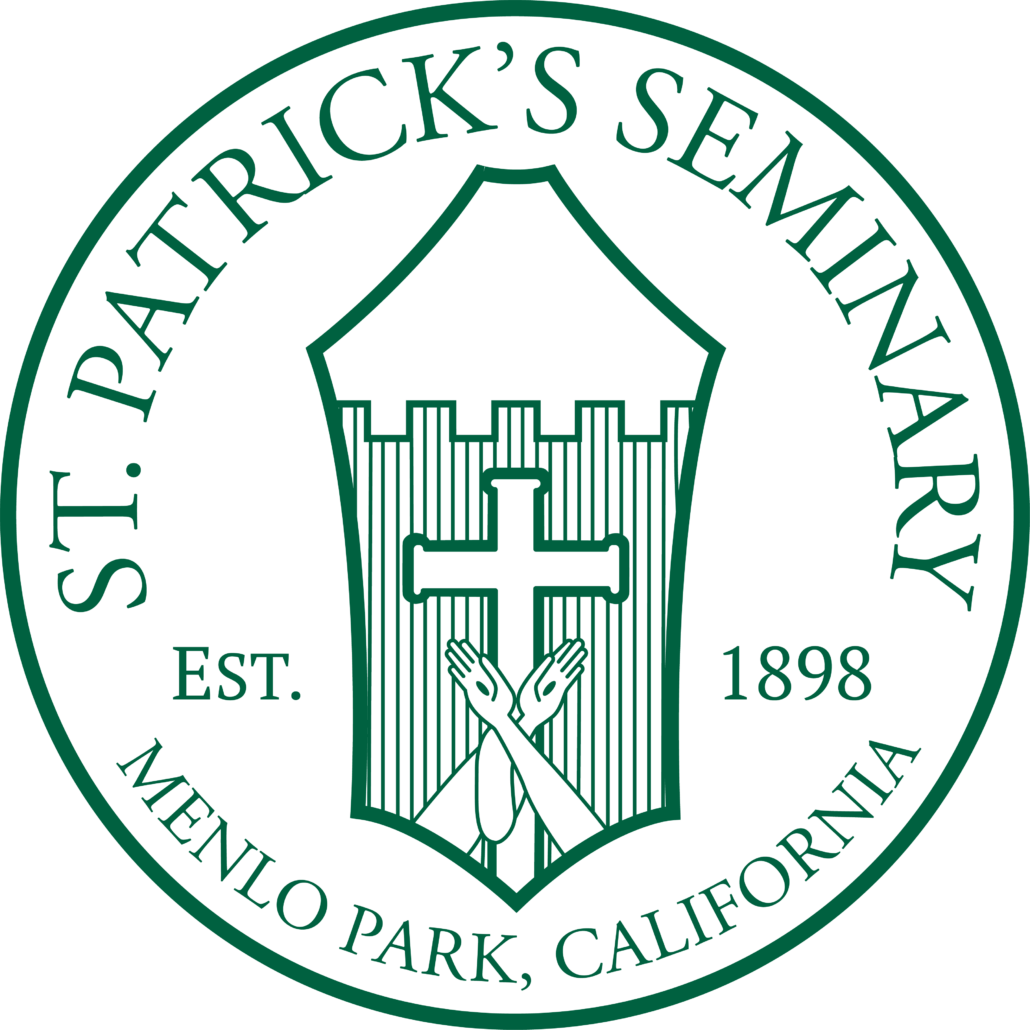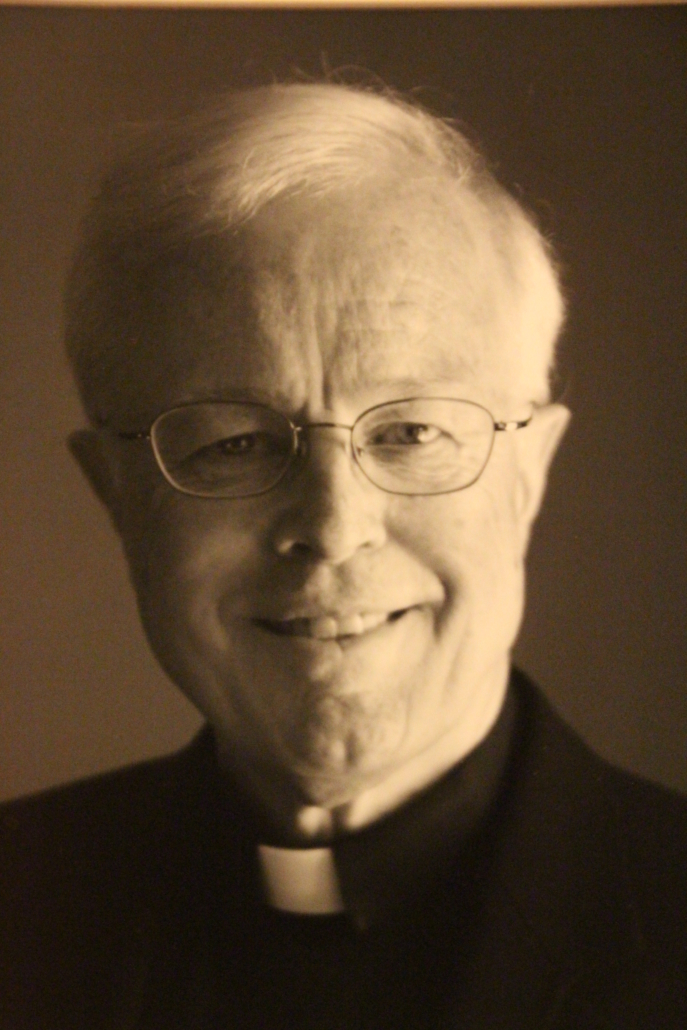In Memoriam
Gerald L. Brown, P.S.S.
December 2, 1938–August 11, 2024
“Where there is no vision, the people perish,” could well have been the motto of Fr. Gerry Brown in his thirty-five years of service in administration—Council member, two-term Provincial, and rector several times over. He is well remembered as someone who had a vision to keep the Province growing and expanding its influence not only on the Church in the United States, but even into Africa.
Born December 2, 1938 in Garden City, Kansas but raised in San Francisco, Fr. Brown was the only boy of the five children of Irvin and Mary (nee Burton) Brown. He was preceded in death by his parents and sisters, Janet and Barbara. He is survived by his sisters, Patricia and Sharon.
Fr. Brown was educated in San Francisco parochial schools and then entered St. Joseph’s Seminary high school in Mountain View, California (1952).
After completing high school, he entered St. Patrick’s College in Mountain View where he earned the B.A. in 1960, and then the M. Div. from St. Patrick’s Seminary in Menlo Park in 1964. While at St. Patrick’s Seminary, he also earned a certificate in church music from the Gregorian Institute of America (1960). This training served him well as he frequently served as cantor for major ceremonies throughout his priestly career. He was ordained for the Archdiocese of San Francisco on June 13, 1964 and joined the Society of St. Sulpice.
Fr. Brown’s first assignment as a Sulpician candidate was to St. Edward’s High School, Kenmore, Washington, where he taught Latin and religion (1964-1965). After his Solitude year in Baltimore, Maryland (1965-1966), he was admitted to the Society of St. Sulpice and returned to the Northwest to teach in the college division of St. Thomas Seminary, Kenmore, Washington (1966-1968). While in Seattle, Fr. Brown became immersed in the charismatic renewal—an experience that strengthened the optimism and openness to diversity that were so characteristic of his personality. At that time, also, he rooted himself in the disciplines of homiletics, communications, and liturgical music—all areas which he drew upon throughout his service to the Society.
In 1968 he began to study for his master’s degree in communication at the University of Washington, Seattle. After receiving the M.A. in 1971, he went to Theological College in Washington, DC until 1975. There he was able to teach preaching and also to introduce a pastoral training program at the Catholic University of America. This program led to establishing an M.A. in Pastoral Studies at the University that enabled Theological College and the University to keep pace with similar programs being developed in other seminaries at that time. In 1975, he began a doctoral program in communications at Temple University, Philadelphia, Pennsylvania which he completed in 1979. His graduate studies prepared him to serve the Province in the areas of research and planning (1972-1975; 1976-1977) as well as on the Council (1973-1979) and later as Provincial (1985-1997). Fr. Brown also served as Rector of St. Patrick’s College in Mountain View from 1978-1985. During that time, he initiated programs to support the increasingly multicultural seminary.
As Provincial, Fr. Brown received the Bishop Loras Lane Award from the Seminary Department of the National Catholic Education Association (NCEA) for his general contribution to seminary education. During his term, he also saw the importance of a Sulpician presence in the Conference of the Major Superiors of Men (CMSM) where the Sulpicians could participate in issues concerning men’s religious life on a national level. Fr. Brown became an influential voice in CMSM and was elected to its Board and Executive Committee and then, in 1994, became its president. In that capacity, he was able to attend the Synod on Consecrated Life and Secular Institutes in Rome in October 1994. As a result of his participation in that event, Fr. Brown became a spokesman for Vita Consecrata, Pope John Paul II’s exhortation on religious life issued after the synod.
During Fr. Brown’s term as Provincial, he oversaw two important developments for the Society and the Province. The first was presiding over the bicentennial anniversary of the Sulpicians’ arrival in the United States in 1791 and the 350th anniversary of the founding of the Society of St. Sulpice in 1641. The year of celebration included alumni celebrations in Honolulu, Seattle, New York, Louisville, and Detroit, all places where the Sulpicians administered seminaries in the past. During that year, Fr. Brown hosted an international conference of representatives of the Sulpician family and the French School of Spirituality at St. Mary’s Seminary & University in Baltimore.
In May 1989 the Province took root in the seminary system in Zambia in central Africa by assigning two Sulpicians, Frs. Ed Frazer and Michael Strange, to the Emmaus Spirituality Centre in Lusaka, Zambia. They were soon followed by five other Sulpicians. Taking root in Zambia was, perhaps, the most significant development during Fr. Brown’s two terms as Provincial. It reflected his openness to new initiatives for the Province. In September 1994, Fr. Brown presented to the Provincial Council his report from his recent visit to Zambia. His report included the invitation from the Zambian Episcopal Conference for the U.S. Province of Sulpicians to assume corporate responsibility for the Emmaus Spirituality Centre with its propaedeutic program. The Council agreed in principle to take corporate responsibility for Emmaus. After details were worked out, the U.S. Province took over the management and administration of Emmaus Spirituality Centre in 1995.
When his second term ended in June 1997, Fr. Brown took a sabbatical at the Vaugirard community in Berkeley, California. In 1998, he was assigned to the recently established Sulpician presence in San Antonio, Texas. There he assisted the Archdiocese with projects of ongoing priestly formation and joined the staff of the multi-cultural formation community of Assumption Seminary. Within two years he was appointed rector of Assumption Seminary. As rector, Fr. Brown embarked on an extensive capital campaign for Assumption Seminary to develop an endowment for scholarships and funds for a new residence hall for seminarians (dedicated in August 2007 as the Archbishop Flores Residence Hall). However, Fr. Brown was not able to see his vision through to completion for he was asked by the Provincial Council (responding to the request of Archbishop Levada of San Francisco) to return to his native San Francisco in 2004 to be the rector of St. Patrick’s Seminary. Fr. Brown served as rector for five years, took another sabbatical, and retired in 2010.
Fr. Brown began his retirement by remaining in residence at St. Patrick’s Seminary for three more years. But he recognized that his health was beginning to decline and he realized that he needed to be in a community that was equipped to provide him the healthcare services that he needed. In July 2013, he moved to the Sulpician retirement community of what was then called St. Charles Villa and is now named Villa Olier in Catonsville, Maryland. At the Villa, his signature laugh filled the hallways while his strong voice as a cantor led the local community in their house liturgies.
Fr. Brown will long be remembered for his optimism, his consistently positive tone, his forward-looking vision and long-range planning, his courage to take on new adventures, his loyalty to the bishops, and his unfailing drive to serve a rapidly evolving priesthood in an ever-changing Church. He represented the best of the post-Vatican II generation of priests that were theologically sophisticated and open to making the transition from the traditional seminary to one that was open to the diverse needs of a rapidly developing post-Vatican II multi-cultural Church.
In the last couple of years, Fr. Brown experienced various ups and downs in his health situation at Villa Olier, including serious bouts with COVID-19. Remarkably, he survived with his good humor intact, but then gradually declined in cognitive and physical ability. He died peacefully at Villa Olier the morning of August 11, 2024 in the presence of his hospice caregivers. The funeral Mass was celebrated at Our Lady of the Angels Parish in Catonsville at 11 A.M. on Monday, August 19, 2024, with fifteen of his Sulpician confreres concelebrating. Fr. Brown’s good friend Fr. Lawrence Terrien, P.S.S., presided in the place of the Provincial, Fr. Daniel Moore, P.S.S., who was out of town. The homilist was another longtime friend, Fr. Melvin Blanchette, P.S.S. Burial followed in the nearby Sulpician Cemetery, and a light reception was held afterwards at Villa Olier for some thirty-five guests, including Fr. Brown’s nephew Jonathan Campbell who represented the family. May Fr. Brown rest in peace!
Ronald D. Witherup, P.S.S.
Acting Provincial Secretary
Society of St. Sulpice
Province of the United States


